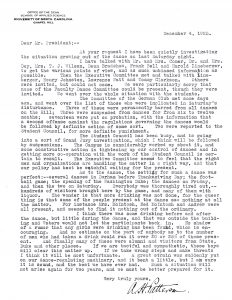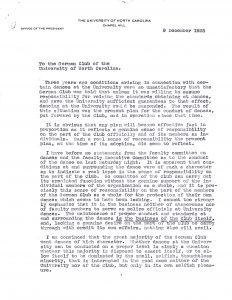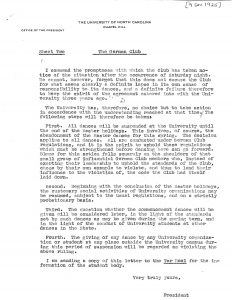
Patterson, A.H., “Report on German Club Dance Incident,” Dec 4, 1925. University of North Carolina Papers (Box 44, Folders 1573-1605), UNC-Chapel Hill University Archives.

Chase, H.W., “Response to German Club Dance Incident,” Dec 9, 1925. University of North Carolina Papers (Box 44, Folders 1573-1605), UNC-Chapel Hill University Archives.

Chase, H.W., “Response to German Club Dance Incident,” Dec 9, 1925. University of North Carolina Papers (Box 44, Folders 1573-1605), UNC-Chapel Hill University Archives.
The passing of the 20th amendment in 1920 put into effect a nationwide ban of alcohol in the U.S. This amendment, however, had a lesser effect on the state of North Carolina, as it had already been operating under its own prohibition laws for twelve years. [1] Nonetheless, people across the state still found ways to consume alcohol, as is shown above in the letters to and from the UNC German Club in 1925. The name “German Club” might lead one to think that this club was formed by people of German heritage; however, the UNC German Club actually had nothing to do with Germany and all to do with the throwing of formal dances and social events for its members. The first letter above was written to President Chase from Andrew Henry Patterson—a professor and the Dean of the School of Applied Sciences at the time. Patterson was writing to report his investigations of a recent German Club party at which illegal drinking had occurred. He states that no more than “20 or 25% of those present” had been drinking, none of which were believed to be women. He also states that he was surprised there wasn’t more drinking, as the football game brought in hundreds of visitors who brought liquor along with them. By the end of the letter, Patterson hints that he believes little action should be taken, and that “the boys will clear this matter up” on their own.
The second source above is President Chase’s response to Patterson’s letter. In this letter, President Chase states that action must be taken in response to the illegal events that occurred at the previous German Club event, and that involved the cancellation of alldances/parties on or near campus until Easter holiday (roughly a full semester period). He also makes it clear that violation of this ruling will have serious consequences. These sources tell us a great deal about the food story of Chapel Hill during the Prohibition era. First, it is made clear that even though alcohol had been banned at this point in North Carolina for roughly seventeen years, it still had a significant presence in the social community of Chapel Hill. According to these sources, it was common back then for people to come from all over the state to engage in social drinking events like sports games and dances. The suspension of all dances/parties by the university in 1925 must have had a significant impact on the food/drinking story of the town. Not only could student/faculty not participate in social drinking behaviors, but they also were not allowed to congregate in a party setting at all. This has major implications on the food story because during this period, much less “party food” was being consumed at the university. Even if prospective parties were never expected to have alcohol present in the first place, and planned to serve only the typical lavish finger foods or multi-course meals, the cancelation of all parties meant that these types of foods were also cancelled until parties were once again allowed in Chapel Hill.
-Ally Dombroski
References:
- Merryman, Kristen. “Prohibition, Bootlegging, and the Law in North Carolina.” DigitalNC. January 17, 2014. Accessed November 07, 2018. https://www.digitalnc.org/blog/prohibition-bootlegging-and-the-law-in-north-carolina/.